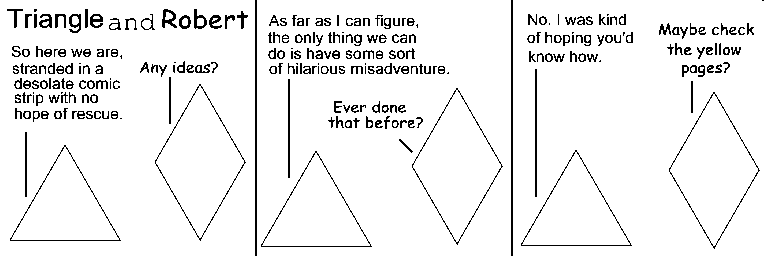I followed Triangle and Robert off and on for a long time. for a long time it sat there not doing anything, and then a few months after I left for Canada, its creator decided it needed an ending. I just finished reading it today.
well, endings are never satisfactory in my mind. i usually find a way to hate them. I have hated J.R.R.Tolkien's endings, I have hated Charlotte Brontë's endings, and I have hated Orson Scott Card's endings. Patrick Shaughnessy will not be in bad company (well, excepting Orson Scott Card) if I decide to hate his ending too.
or maybe i should try to get over my dislike of endings. things do have to end.
near the bottom of the antepenultimate page of Triangle and Robert, though, there was this very interesting comment about butterscotch and tapioca (please pardon my lack of capitalization in this transcription)...
the cartoonist says:
"there's nothing evil about tapioca. there's nothing good about butterscotch that isn't also true of tapioca. they're not morally opposed, they're just incompatible in a fundamental way that has nothing to do with right or wrong.in light of a rather confusing conversation I had about arbitrariness this afternoon, this all stood out to me as quite symbolic. good luck to me remembering exactly how. something about the primal and anomalous sort of tied into that trilogy by Philip Pullman, and it all echoed so subtly so much of my own discontent about nobody being able to answer the question why...
butterscotch is of a continuous nature. tapioca is of a discrete nature. it happens that, in this particular universe, at this particular time, butterscotch was the primal state and tapioca was the anomalous one. It also happens that at this particular time, butterscotch was beneficial and tapioca detrimental. neither of those facts is fundamental, and the two facts themselves are uncorrelated."
but I probably shouldn't start pulling all my philosophy from fiction. fiction always ends.
or does it?


No comments:
Post a Comment